Mandatory Detention: A Nursing Perspective - Diploma Presentation
VerifiedAdded on 2020/02/18
|6
|1411
|44
Presentation
AI Summary
This presentation, prepared for a Diploma of Nursing, addresses the contentious issue of mandatory detention in Australia. It provides an overview of the policy, enacted in 1992, and its impact on asylum seekers. The presentation explores the historical context, the legal and ethical dimensions, and the cultural factors influencing the debate. It examines the detrimental effects of detention on the mental and physical health of detainees, including depression, PTSD, and other health issues, and the barriers to accessing healthcare. The presentation highlights the importance of a collaborative approach by healthcare professionals, particularly nurses, in providing compassionate and comprehensive care, while also considering the perspectives of the Australian community and the violation of human rights. The presentation draws on research to advocate for reevaluating the detention policy and improving the treatment of asylum seekers.
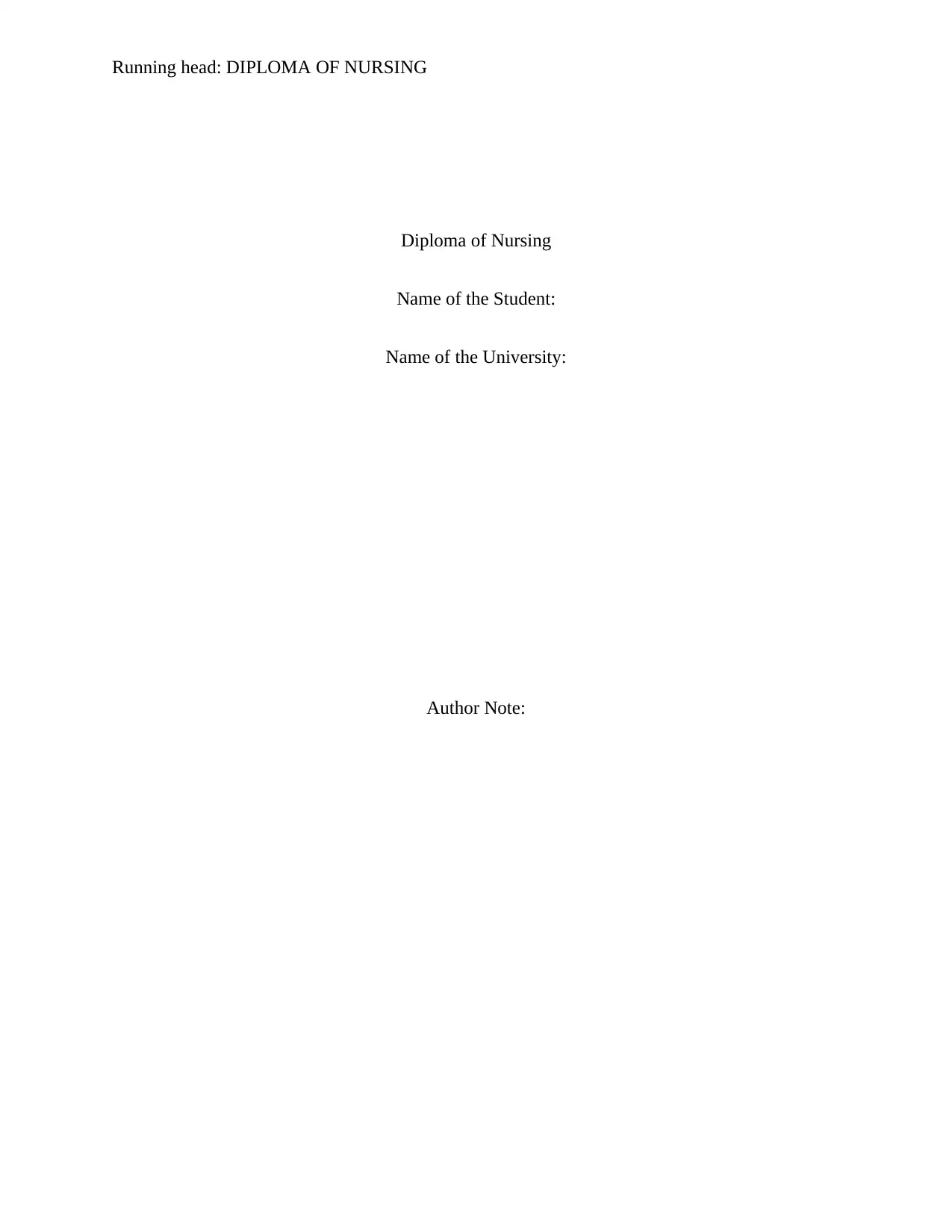
Running head: DIPLOMA OF NURSING
Diploma of Nursing
Name of the Student:
Name of the University:
Author Note:
Diploma of Nursing
Name of the Student:
Name of the University:
Author Note:
Paraphrase This Document
Need a fresh take? Get an instant paraphrase of this document with our AI Paraphraser
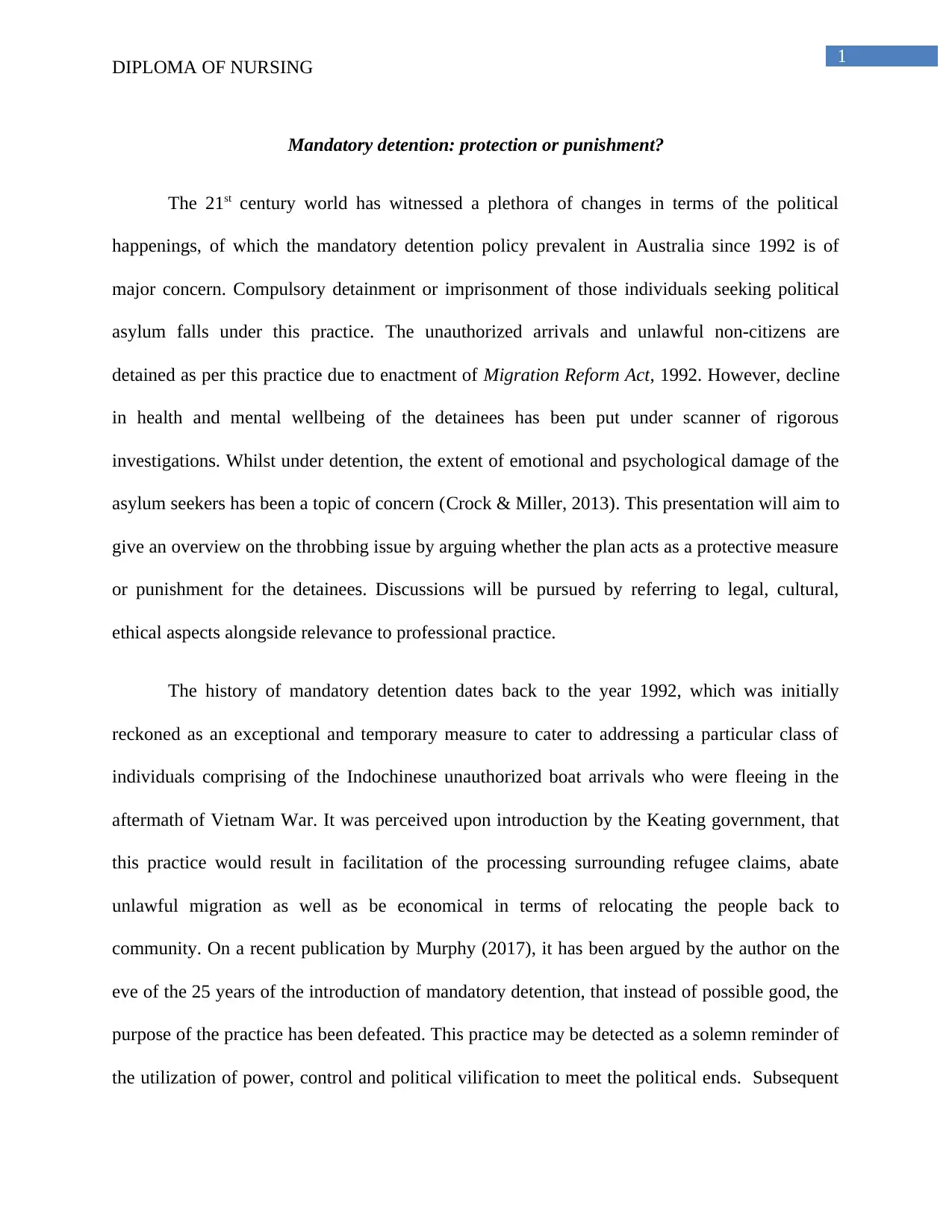
1
DIPLOMA OF NURSING
Mandatory detention: protection or punishment?
The 21st century world has witnessed a plethora of changes in terms of the political
happenings, of which the mandatory detention policy prevalent in Australia since 1992 is of
major concern. Compulsory detainment or imprisonment of those individuals seeking political
asylum falls under this practice. The unauthorized arrivals and unlawful non-citizens are
detained as per this practice due to enactment of Migration Reform Act, 1992. However, decline
in health and mental wellbeing of the detainees has been put under scanner of rigorous
investigations. Whilst under detention, the extent of emotional and psychological damage of the
asylum seekers has been a topic of concern (Crock & Miller, 2013). This presentation will aim to
give an overview on the throbbing issue by arguing whether the plan acts as a protective measure
or punishment for the detainees. Discussions will be pursued by referring to legal, cultural,
ethical aspects alongside relevance to professional practice.
The history of mandatory detention dates back to the year 1992, which was initially
reckoned as an exceptional and temporary measure to cater to addressing a particular class of
individuals comprising of the Indochinese unauthorized boat arrivals who were fleeing in the
aftermath of Vietnam War. It was perceived upon introduction by the Keating government, that
this practice would result in facilitation of the processing surrounding refugee claims, abate
unlawful migration as well as be economical in terms of relocating the people back to
community. On a recent publication by Murphy (2017), it has been argued by the author on the
eve of the 25 years of the introduction of mandatory detention, that instead of possible good, the
purpose of the practice has been defeated. This practice may be detected as a solemn reminder of
the utilization of power, control and political vilification to meet the political ends. Subsequent
DIPLOMA OF NURSING
Mandatory detention: protection or punishment?
The 21st century world has witnessed a plethora of changes in terms of the political
happenings, of which the mandatory detention policy prevalent in Australia since 1992 is of
major concern. Compulsory detainment or imprisonment of those individuals seeking political
asylum falls under this practice. The unauthorized arrivals and unlawful non-citizens are
detained as per this practice due to enactment of Migration Reform Act, 1992. However, decline
in health and mental wellbeing of the detainees has been put under scanner of rigorous
investigations. Whilst under detention, the extent of emotional and psychological damage of the
asylum seekers has been a topic of concern (Crock & Miller, 2013). This presentation will aim to
give an overview on the throbbing issue by arguing whether the plan acts as a protective measure
or punishment for the detainees. Discussions will be pursued by referring to legal, cultural,
ethical aspects alongside relevance to professional practice.
The history of mandatory detention dates back to the year 1992, which was initially
reckoned as an exceptional and temporary measure to cater to addressing a particular class of
individuals comprising of the Indochinese unauthorized boat arrivals who were fleeing in the
aftermath of Vietnam War. It was perceived upon introduction by the Keating government, that
this practice would result in facilitation of the processing surrounding refugee claims, abate
unlawful migration as well as be economical in terms of relocating the people back to
community. On a recent publication by Murphy (2017), it has been argued by the author on the
eve of the 25 years of the introduction of mandatory detention, that instead of possible good, the
purpose of the practice has been defeated. This practice may be detected as a solemn reminder of
the utilization of power, control and political vilification to meet the political ends. Subsequent
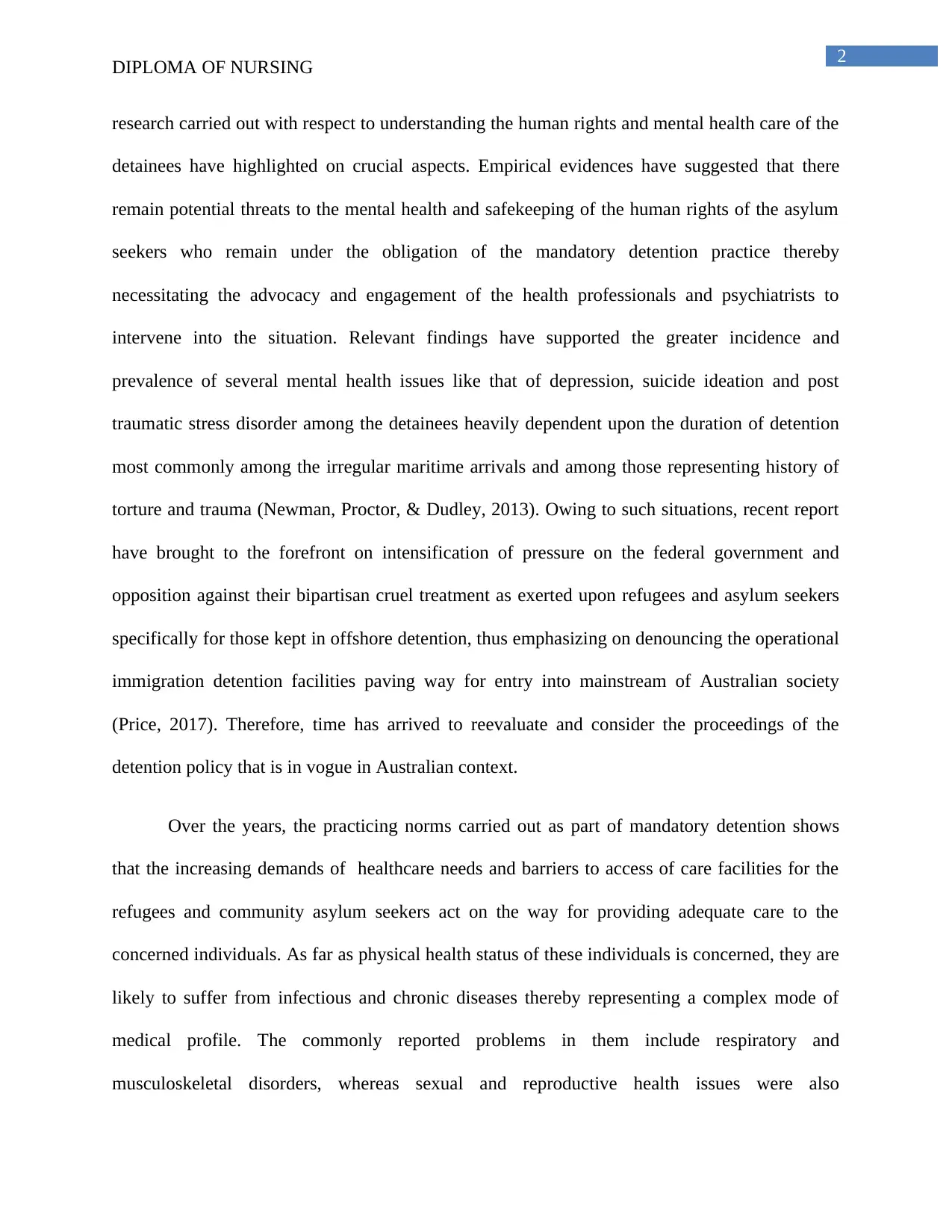
2
DIPLOMA OF NURSING
research carried out with respect to understanding the human rights and mental health care of the
detainees have highlighted on crucial aspects. Empirical evidences have suggested that there
remain potential threats to the mental health and safekeeping of the human rights of the asylum
seekers who remain under the obligation of the mandatory detention practice thereby
necessitating the advocacy and engagement of the health professionals and psychiatrists to
intervene into the situation. Relevant findings have supported the greater incidence and
prevalence of several mental health issues like that of depression, suicide ideation and post
traumatic stress disorder among the detainees heavily dependent upon the duration of detention
most commonly among the irregular maritime arrivals and among those representing history of
torture and trauma (Newman, Proctor, & Dudley, 2013). Owing to such situations, recent report
have brought to the forefront on intensification of pressure on the federal government and
opposition against their bipartisan cruel treatment as exerted upon refugees and asylum seekers
specifically for those kept in offshore detention, thus emphasizing on denouncing the operational
immigration detention facilities paving way for entry into mainstream of Australian society
(Price, 2017). Therefore, time has arrived to reevaluate and consider the proceedings of the
detention policy that is in vogue in Australian context.
Over the years, the practicing norms carried out as part of mandatory detention shows
that the increasing demands of healthcare needs and barriers to access of care facilities for the
refugees and community asylum seekers act on the way for providing adequate care to the
concerned individuals. As far as physical health status of these individuals is concerned, they are
likely to suffer from infectious and chronic diseases thereby representing a complex mode of
medical profile. The commonly reported problems in them include respiratory and
musculoskeletal disorders, whereas sexual and reproductive health issues were also
DIPLOMA OF NURSING
research carried out with respect to understanding the human rights and mental health care of the
detainees have highlighted on crucial aspects. Empirical evidences have suggested that there
remain potential threats to the mental health and safekeeping of the human rights of the asylum
seekers who remain under the obligation of the mandatory detention practice thereby
necessitating the advocacy and engagement of the health professionals and psychiatrists to
intervene into the situation. Relevant findings have supported the greater incidence and
prevalence of several mental health issues like that of depression, suicide ideation and post
traumatic stress disorder among the detainees heavily dependent upon the duration of detention
most commonly among the irregular maritime arrivals and among those representing history of
torture and trauma (Newman, Proctor, & Dudley, 2013). Owing to such situations, recent report
have brought to the forefront on intensification of pressure on the federal government and
opposition against their bipartisan cruel treatment as exerted upon refugees and asylum seekers
specifically for those kept in offshore detention, thus emphasizing on denouncing the operational
immigration detention facilities paving way for entry into mainstream of Australian society
(Price, 2017). Therefore, time has arrived to reevaluate and consider the proceedings of the
detention policy that is in vogue in Australian context.
Over the years, the practicing norms carried out as part of mandatory detention shows
that the increasing demands of healthcare needs and barriers to access of care facilities for the
refugees and community asylum seekers act on the way for providing adequate care to the
concerned individuals. As far as physical health status of these individuals is concerned, they are
likely to suffer from infectious and chronic diseases thereby representing a complex mode of
medical profile. The commonly reported problems in them include respiratory and
musculoskeletal disorders, whereas sexual and reproductive health issues were also
⊘ This is a preview!⊘
Do you want full access?
Subscribe today to unlock all pages.

Trusted by 1+ million students worldwide
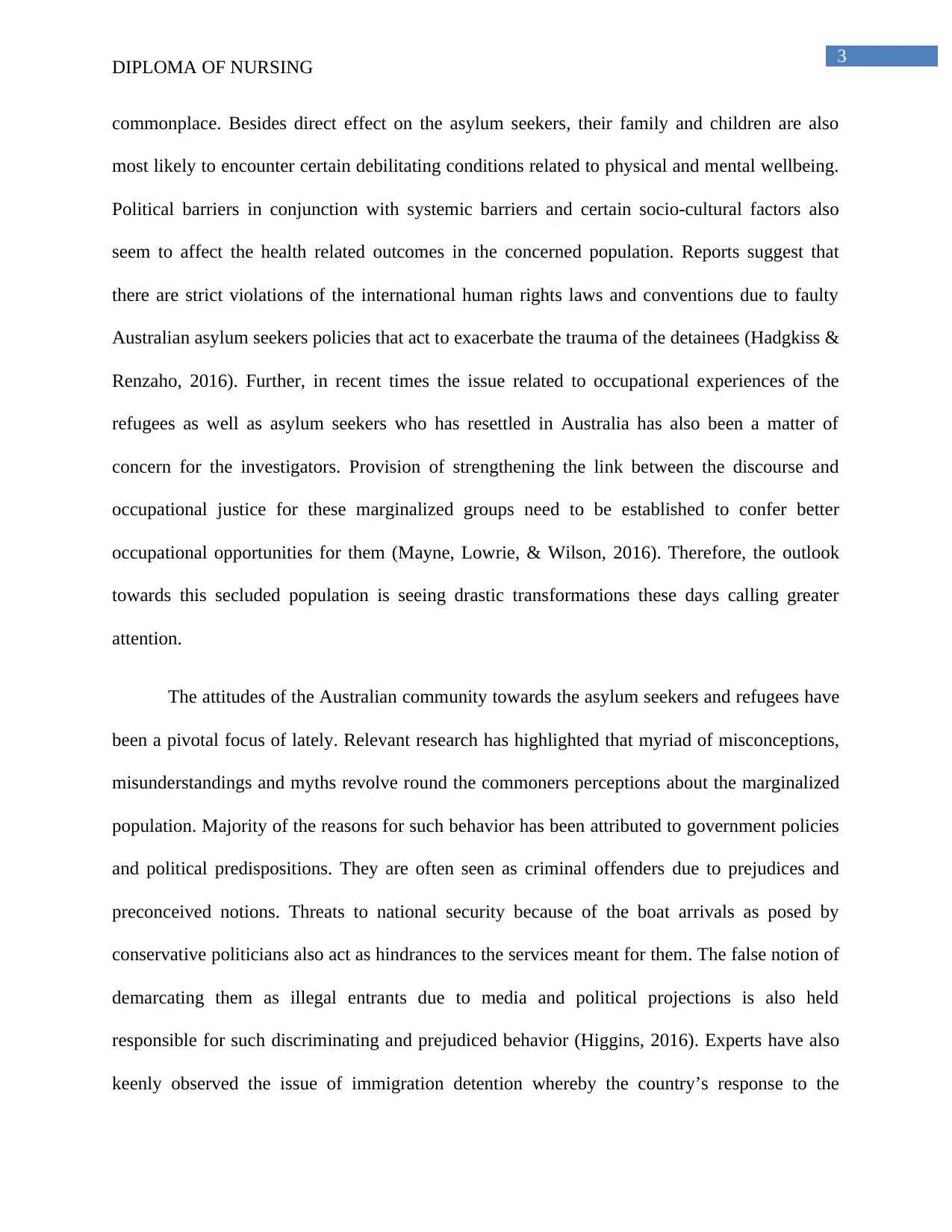
3
DIPLOMA OF NURSING
commonplace. Besides direct effect on the asylum seekers, their family and children are also
most likely to encounter certain debilitating conditions related to physical and mental wellbeing.
Political barriers in conjunction with systemic barriers and certain socio-cultural factors also
seem to affect the health related outcomes in the concerned population. Reports suggest that
there are strict violations of the international human rights laws and conventions due to faulty
Australian asylum seekers policies that act to exacerbate the trauma of the detainees (Hadgkiss &
Renzaho, 2016). Further, in recent times the issue related to occupational experiences of the
refugees as well as asylum seekers who has resettled in Australia has also been a matter of
concern for the investigators. Provision of strengthening the link between the discourse and
occupational justice for these marginalized groups need to be established to confer better
occupational opportunities for them (Mayne, Lowrie, & Wilson, 2016). Therefore, the outlook
towards this secluded population is seeing drastic transformations these days calling greater
attention.
The attitudes of the Australian community towards the asylum seekers and refugees have
been a pivotal focus of lately. Relevant research has highlighted that myriad of misconceptions,
misunderstandings and myths revolve round the commoners perceptions about the marginalized
population. Majority of the reasons for such behavior has been attributed to government policies
and political predispositions. They are often seen as criminal offenders due to prejudices and
preconceived notions. Threats to national security because of the boat arrivals as posed by
conservative politicians also act as hindrances to the services meant for them. The false notion of
demarcating them as illegal entrants due to media and political projections is also held
responsible for such discriminating and prejudiced behavior (Higgins, 2016). Experts have also
keenly observed the issue of immigration detention whereby the country’s response to the
DIPLOMA OF NURSING
commonplace. Besides direct effect on the asylum seekers, their family and children are also
most likely to encounter certain debilitating conditions related to physical and mental wellbeing.
Political barriers in conjunction with systemic barriers and certain socio-cultural factors also
seem to affect the health related outcomes in the concerned population. Reports suggest that
there are strict violations of the international human rights laws and conventions due to faulty
Australian asylum seekers policies that act to exacerbate the trauma of the detainees (Hadgkiss &
Renzaho, 2016). Further, in recent times the issue related to occupational experiences of the
refugees as well as asylum seekers who has resettled in Australia has also been a matter of
concern for the investigators. Provision of strengthening the link between the discourse and
occupational justice for these marginalized groups need to be established to confer better
occupational opportunities for them (Mayne, Lowrie, & Wilson, 2016). Therefore, the outlook
towards this secluded population is seeing drastic transformations these days calling greater
attention.
The attitudes of the Australian community towards the asylum seekers and refugees have
been a pivotal focus of lately. Relevant research has highlighted that myriad of misconceptions,
misunderstandings and myths revolve round the commoners perceptions about the marginalized
population. Majority of the reasons for such behavior has been attributed to government policies
and political predispositions. They are often seen as criminal offenders due to prejudices and
preconceived notions. Threats to national security because of the boat arrivals as posed by
conservative politicians also act as hindrances to the services meant for them. The false notion of
demarcating them as illegal entrants due to media and political projections is also held
responsible for such discriminating and prejudiced behavior (Higgins, 2016). Experts have also
keenly observed the issue of immigration detention whereby the country’s response to the
Paraphrase This Document
Need a fresh take? Get an instant paraphrase of this document with our AI Paraphraser
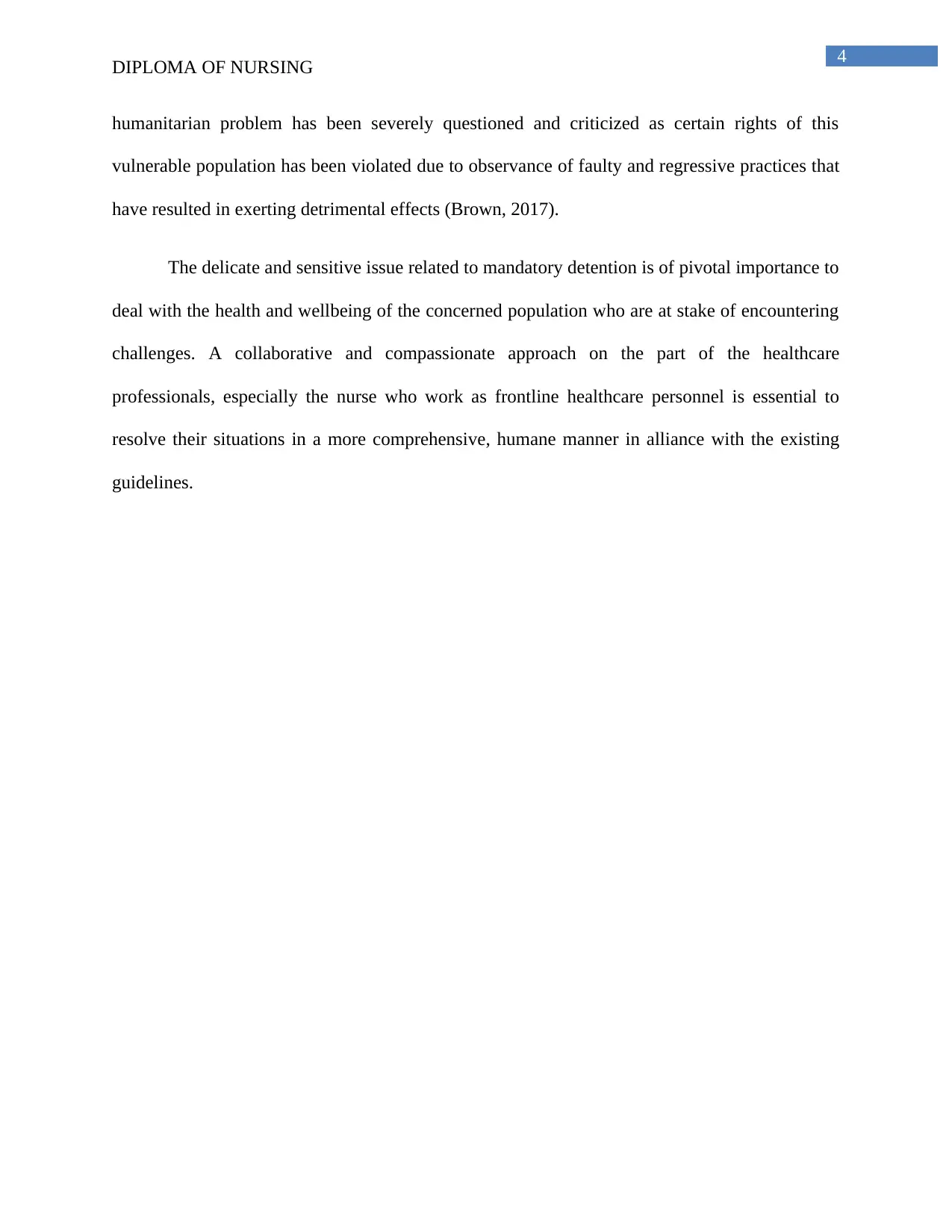
4
DIPLOMA OF NURSING
humanitarian problem has been severely questioned and criticized as certain rights of this
vulnerable population has been violated due to observance of faulty and regressive practices that
have resulted in exerting detrimental effects (Brown, 2017).
The delicate and sensitive issue related to mandatory detention is of pivotal importance to
deal with the health and wellbeing of the concerned population who are at stake of encountering
challenges. A collaborative and compassionate approach on the part of the healthcare
professionals, especially the nurse who work as frontline healthcare personnel is essential to
resolve their situations in a more comprehensive, humane manner in alliance with the existing
guidelines.
DIPLOMA OF NURSING
humanitarian problem has been severely questioned and criticized as certain rights of this
vulnerable population has been violated due to observance of faulty and regressive practices that
have resulted in exerting detrimental effects (Brown, 2017).
The delicate and sensitive issue related to mandatory detention is of pivotal importance to
deal with the health and wellbeing of the concerned population who are at stake of encountering
challenges. A collaborative and compassionate approach on the part of the healthcare
professionals, especially the nurse who work as frontline healthcare personnel is essential to
resolve their situations in a more comprehensive, humane manner in alliance with the existing
guidelines.
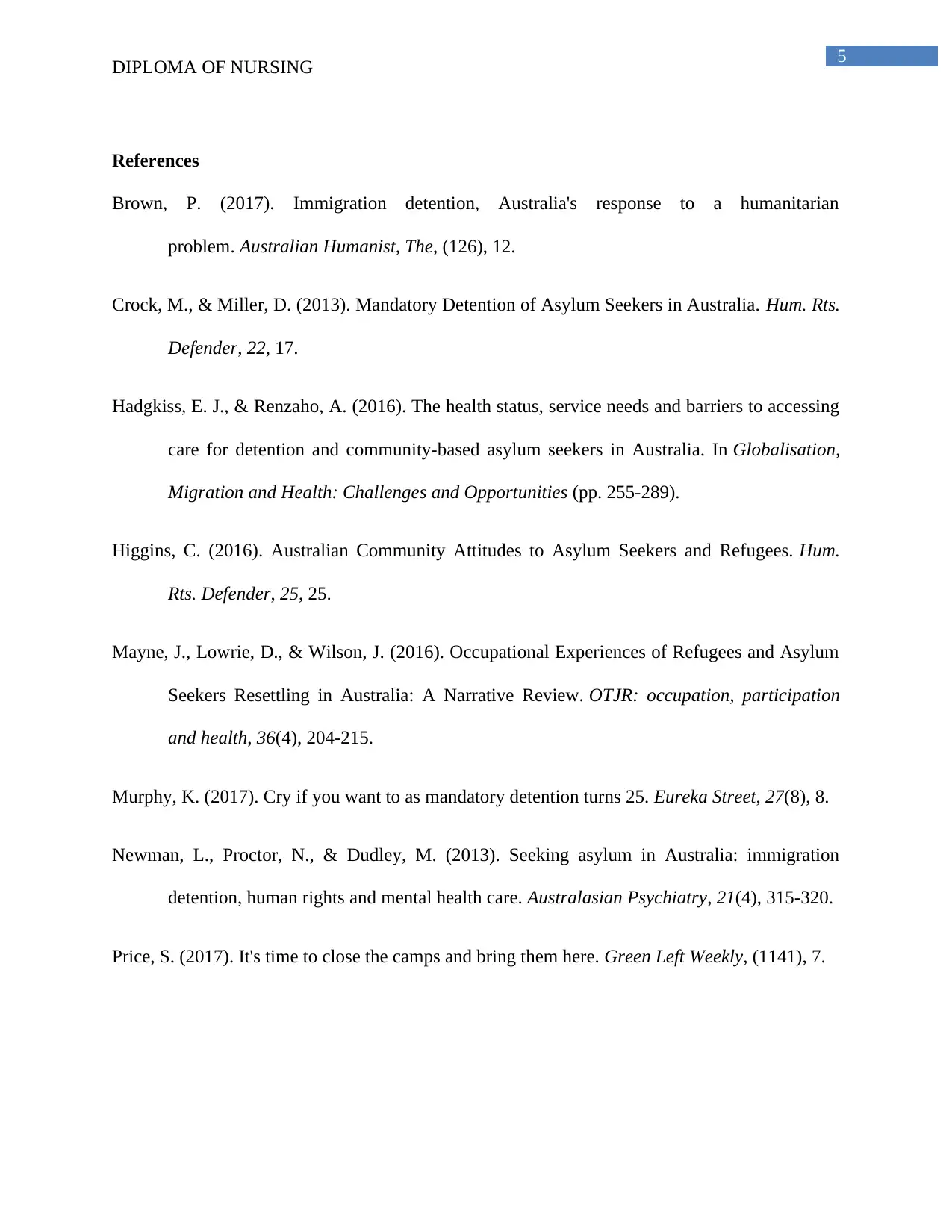
5
DIPLOMA OF NURSING
References
Brown, P. (2017). Immigration detention, Australia's response to a humanitarian
problem. Australian Humanist, The, (126), 12.
Crock, M., & Miller, D. (2013). Mandatory Detention of Asylum Seekers in Australia. Hum. Rts.
Defender, 22, 17.
Hadgkiss, E. J., & Renzaho, A. (2016). The health status, service needs and barriers to accessing
care for detention and community-based asylum seekers in Australia. In Globalisation,
Migration and Health: Challenges and Opportunities (pp. 255-289).
Higgins, C. (2016). Australian Community Attitudes to Asylum Seekers and Refugees. Hum.
Rts. Defender, 25, 25.
Mayne, J., Lowrie, D., & Wilson, J. (2016). Occupational Experiences of Refugees and Asylum
Seekers Resettling in Australia: A Narrative Review. OTJR: occupation, participation
and health, 36(4), 204-215.
Murphy, K. (2017). Cry if you want to as mandatory detention turns 25. Eureka Street, 27(8), 8.
Newman, L., Proctor, N., & Dudley, M. (2013). Seeking asylum in Australia: immigration
detention, human rights and mental health care. Australasian Psychiatry, 21(4), 315-320.
Price, S. (2017). It's time to close the camps and bring them here. Green Left Weekly, (1141), 7.
DIPLOMA OF NURSING
References
Brown, P. (2017). Immigration detention, Australia's response to a humanitarian
problem. Australian Humanist, The, (126), 12.
Crock, M., & Miller, D. (2013). Mandatory Detention of Asylum Seekers in Australia. Hum. Rts.
Defender, 22, 17.
Hadgkiss, E. J., & Renzaho, A. (2016). The health status, service needs and barriers to accessing
care for detention and community-based asylum seekers in Australia. In Globalisation,
Migration and Health: Challenges and Opportunities (pp. 255-289).
Higgins, C. (2016). Australian Community Attitudes to Asylum Seekers and Refugees. Hum.
Rts. Defender, 25, 25.
Mayne, J., Lowrie, D., & Wilson, J. (2016). Occupational Experiences of Refugees and Asylum
Seekers Resettling in Australia: A Narrative Review. OTJR: occupation, participation
and health, 36(4), 204-215.
Murphy, K. (2017). Cry if you want to as mandatory detention turns 25. Eureka Street, 27(8), 8.
Newman, L., Proctor, N., & Dudley, M. (2013). Seeking asylum in Australia: immigration
detention, human rights and mental health care. Australasian Psychiatry, 21(4), 315-320.
Price, S. (2017). It's time to close the camps and bring them here. Green Left Weekly, (1141), 7.
⊘ This is a preview!⊘
Do you want full access?
Subscribe today to unlock all pages.

Trusted by 1+ million students worldwide
1 out of 6
Related Documents
Your All-in-One AI-Powered Toolkit for Academic Success.
+13062052269
info@desklib.com
Available 24*7 on WhatsApp / Email
![[object Object]](/_next/static/media/star-bottom.7253800d.svg)
Unlock your academic potential
Copyright © 2020–2026 A2Z Services. All Rights Reserved. Developed and managed by ZUCOL.




